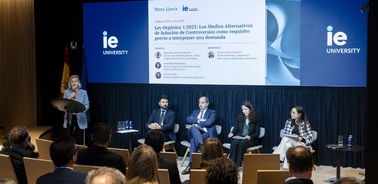- Home
- We Are Law School
- News
- The Pérez-llorca & Ie Chair Analyzes Adr Mechanisms And Their Immediate Impact On Legal And Business Practices
The Pérez-Llorca & IE Chair analyzes ADR mechanisms and their immediate impact on legal and business practices

The recent approval of Organic Law 1/2025 represents a structural change in access to civil and commercial justice in Spain.
Pérez-Llorca and IE Law School held a new session of their Commercial Law Chair on March 20, focused on the impact of Organic Law 1/2025 and its most relevant procedural measure: the requirement to first resort to the so-called Medios Adecuados de Solución de Controversias (MASC) —known in the Anglo-Saxon context as Alternative Dispute Resolution (ADR)— as a precondition for filing a lawsuit.
The event, which brought together prominent experts from the legal field, was moderated by Javier García Marrero, Arbitration and Litigation Partner at Pérez-Llorca and a judge currently on leave. Participants in the debate included Alejandro Asensio Muñoz, Court Clerk of Commercial Court No. 16 in Madrid; Ana María Rodríguez Conde, Litigation and European Union Law Partner at Pérez-Llorca; and Silvia de Paz Pérez, Litigation and Arbitration Partner at Pérez-Llorca.
Organic Law 1/2025 is the third of the so-called “Efficiency Laws” promoted by the Government to modernize the judicial system and reorganize the functioning of the courts. In the words of García Marrero, “it is probably the most important reform in the civil field in the 21st century.”
As of April 3, ADRs will become a mandatory procedural requirement to initiate civil or commercial judicial proceedings. Failure to comply with this requirement will result in the inadmissibility of the claim.
During the event, key issues were addressed, such as the types of ADRs provided by the law and the possibility of incorporating other alternative methods; the practical implications for companies and lawyers, especially in the drafting of contractual clauses; the impact on limitation and expiry periods; and the possibility of correcting procedural errors.
In this context, Asensio Muñoz expressed some doubts about their effectiveness: “I have some reservations that this will work or that it will be the mechanism to improve court efficiency,” he said. He added: “The key to ADRs will be the legal costs.”
For her part, Rodríguez Conde warned about the law’s approach regarding access to justice: “ADRs do not ensure equal treatment regarding the right of access to justice, which is concerning.” She also highlighted aspects such as the remuneration of neutral third parties: “The law does state that you remunerate your lawyer, but it says nothing about what happens if you go to a third party. It only says that if you seek the opinion of a neutral expert in the subject matter, in that case, the parties will agree on the remuneration.”
De Paz Pérez emphasized the flexible nature of the new regulatory framework: “My interpretation from a comprehensive reading of the law is that it is an open list. What you have to prove is that you have attempted to negotiate. In fact, the law itself allows negotiation between the parties through a court attorney (procurador).”
Among the most debated topics, attention was focused on the need to ensure the confidentiality of negotiations and the potential unconstitutionality of the procedural requirement. On this last point, Rodríguez Conde noted: “The General Council of the Judiciary conducted a preliminary analysis of the rule in the draft bill report regarding potential unconstitutionality, and also carried out a comparative law study. In both documents, it made clear —and I agree— that there was no cause for unconstitutionality. However, it did warn of a suitability issue, considering that the law was excessively broad.” To this, Asensio Muñoz added: “I believe that the critical issue is the nature of ADRs, that is, their mandatory character.”
ABOUT THE PÉREZ-LLORCA & IE CHAIR IN COMMERCIAL LAW
The Pérez-Llorca & IE Chair is a joint initiative of IE Law School and Pérez-Llorca aimed at promoting top-level applied research in the field of Commercial Law, as well as disseminating this research to law firms, companies, and law schools through joint actions between both institutions. The Chair’s research is reflected in the publication of books, working papers, briefing notes, and academic articles.